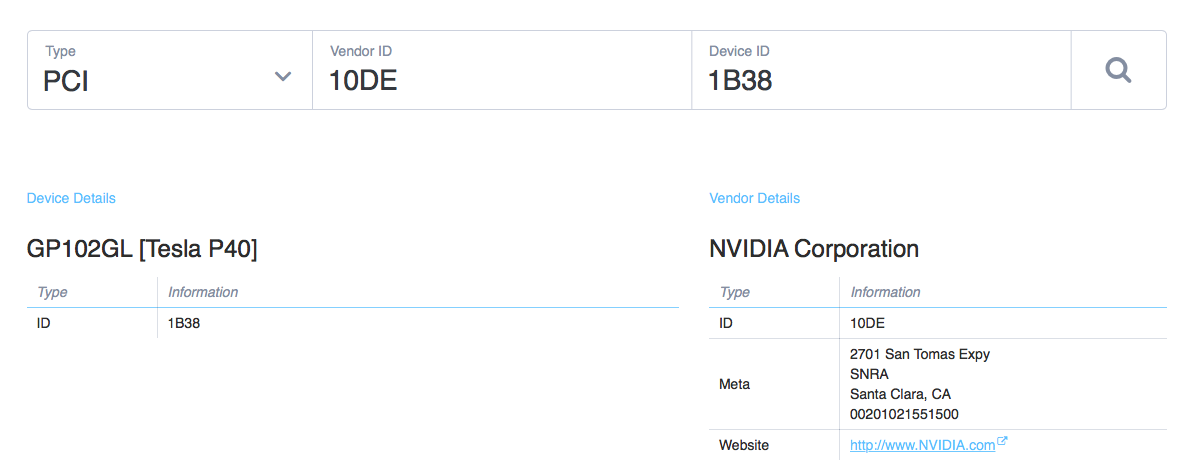Nova¶
Contents
Local LVM2 storage¶
A volume group with the name
novais created first with fileenvironments/kolla/files/overlays/nova/nova-compute.conf.
[libvirt]
images_type = lvm
images_volume_group = nova
sparse_logical_volumes = False
disk_cachemodes = "file=directsync,block=directsync,network=directsync"
Local file storage¶
For using flat file enable in read as follow
environments/kolla/files/overlays/nova/nova-compute.conf.
[libvirt]
images_type = default
Note
if the setup demands different backend types for ephemeral storage, it is recommend to seperate this compute hosts in an own host aggreate and bind this aggereate to an own flavor.
Virtual GPUs¶
NVIDIA¶
https://docs.nvidia.com/grid/latest/grid-vgpu-release-notes-generic-linux-kvm/index.html
identify the available GPUs
$ lspci | grep NVIDIA
02:00.0 3D controller: NVIDIA Corporation Device 1b38 (rev a1)
82:00.0 3D controller: NVIDIA Corporation Device 1b38 (rev a1)
85:00.0 3D controller: NVIDIA Corporation Device 1b38 (rev a1)
86:00.0 3D controller: NVIDIA Corporation Device 1b38 (rev a1)
$ lshw -numeric -C display
WARNING: you should run this program as super-user.
*-display
description: 3D controller
product: NVIDIA Corporation [10DE:1B38]
vendor: NVIDIA Corporation [10DE]
[...]
resolve the PCI device ID e.g. with https://devicehunt.com

PCI passthrough¶
https://docs.openstack.org/nova/latest/admin/pci-passthrough.html
https://docs.openstack.org/nova/latest/configuration/config.html#pci
check IOMMU support
$ dmesg | grep IOMMU [ 0.000000] DMAR: IOMMU enabled [ 0.207515] DMAR-IR: IOAPIC id 12 under DRHD base 0xc5ffc000 IOMMU 6 [ 0.207516] DMAR-IR: IOAPIC id 11 under DRHD base 0xb87fc000 IOMMU 5 [ 0.207518] DMAR-IR: IOAPIC id 10 under DRHD base 0xaaffc000 IOMMU 4 [ 0.207519] DMAR-IR: IOAPIC id 18 under DRHD base 0xfbffc000 IOMMU 3 [ 0.207520] DMAR-IR: IOAPIC id 17 under DRHD base 0xee7fc000 IOMMU 2 [ 0.207522] DMAR-IR: IOAPIC id 16 under DRHD base 0xe0ffc000 IOMMU 1 [ 0.207523] DMAR-IR: IOAPIC id 15 under DRHD base 0xd37fc000 IOMMU 0 [ 0.207525] DMAR-IR: IOAPIC id 8 under DRHD base 0x9d7fc000 IOMMU 7 [ 0.207526] DMAR-IR: IOAPIC id 9 under DRHD base 0x9d7fc000 IOMMU 7
IOMMU PASS
$ docker exec -it nova_libvirt virt-host-validate [...] QEMU: Checking for device assignment IOMMU support : PASS QEMU: Checking if IOMMU is enabled by kernel : PASS [...]
IOMMU WARN
$ docker exec -it nova_libvirt virt-host-validate [...] QEMU: Checking for device assignment IOMMU support : PASS QEMU: Checking if IOMMU is enabled by kernel : WARN (IOMMU appears to be disabled in kernel. Add intel_iommu=on to kernel cmdline arguments) [...]
check if the nouveau kernel module is loaded
$ lsmod | grep nouveau nouveau 1503232 0 mxm_wmi 16384 1 nouveau video 40960 1 nouveau ttm 98304 2 ast,nouveau drm_kms_helper 155648 2 ast,nouveau drm 364544 6 ast,ttm,drm_kms_helper,nouveau i2c_algo_bit 16384 3 ast,igb,nouveau wmi 20480 2 mxm_wmi,nouveau
disable nouveau in
/etc/modprobe.d/blacklist-nvidia-nouveau.confblacklist nouveau blacklist snd_hda_intel # consumer gpu options nouveau modeset=0
get vendor and product IDs
$ lspci -nn
enable PCI passthrough module in
/etc/modprobe.d/vfio.confoptions vfio-pci ids=10de:1b38[,10de:1038] options vfio-pci disable_vga=1
enable module after reboot in
/etc/modules... vfio-pci
rebuild the initramfs and reboot
$ sudo update-initramfs -u $ sudo reboot
check if
vfiois used for ID$ lspci -nnk -s 84:00.0 84:00.0 VGA compatible controller [0300]: NVIDIA Corporation GV102 [10de:1e07] (rev a1) Subsystem: Gigabyte Technology Co., Ltd Device [1458:37a9] Kernel driver in use: vfio-pci Kernel modules: nvidiafb, nouveau
enable the
PciPassthroughFilterscheduler inenvironments/kolla/files/overlays/nova/nova-scheduler.conf[filter_scheduler] enabled_filters = ..., PciPassthroughFilter
specify PCI aliases for the devices in
environments/kolla/files/overlays/nova/nova-api.confandenvironments/kolla/files/overlays/nova/nova-compute.conf[pci] alias = { "vendor_id": "10de", "product_id":"1b38", "device_type":"type-PCI", "name":"nvidiap40" } alias = { "vendor_id": "10de", "product_id":"1adf", "device_type":"type-PCI", "name":"nvidiap40" }
Look into nova-compute.log on GPU-hypervisor for device_type. Possible values are type-PCI, type-PF or type-VF.
whitelist PCI devices in
environments/kolla/files/overlays/nova/nova-compute.conf[pci] passthrough_whitelist = { "address": "0000:41:00.0" }, { "address": "0000:84:00.0" }
or
[pci] passthrough_whitelist = { "vendor_id": "10de", "product_id": "1b38" }, { "vendor_id": "10de", "product_id": "1adf" }
Note
In most environments not all compute nodes are equipped with a GPU. Store the compute node specific configurations in host specific overall files, e.g.
in environments/kolla/files/overlays/nova/52-10.betacloud.xyz/nova.conf.
[pci]
alias = { "vendor_id": "10de", "product_id":"1b38", "device_type":"type-PCI", "name":"nvidiap40" }
passthrough_whitelist = { "vendor_id": "10de", "product_id": "1b38" }
set the
pci_passthrough:alias"property on a flavorfor one device $ openstack flavor set --property "pci_passthrough:alias"="nvidiap40:1" 1C-1G-1GB-10GB-GPU for more devices, the last digit is for the amount of devices $ openstack flavor set --property "pci_passthrough:alias"="nvidiap40:2" 1C-1G-1GB-10GB-GPU
Resource isolation¶
$ python nova_mem_cpu_calc.py HOST_MEMORY_GBYTE OSDS_PER_SERVER GUEST_AVG_MEMORY_GBYTE GUEST_AVG_CPU_UTIL
$ python nova_mem_cpu_calc.py 256 56 6 8 0.1
Inputs:
- Total host RAM in GB: 256
- Total host cores: 56
- Ceph OSDs per host: 6
- Average guest memory size in GB: 8
- Average guest CPU utilization: 10%
Results:
- number of guests allowed based on memory = 28
- number of guest vCPUs allowed = 500
- nova.conf reserved_host_memory = 32000 MB
- nova.conf cpu_allocation_ratio = 8.928571
Compare “guest vCPUs allowed” to “guests allowed based on memory” for actual guest count in environments/kolla/files/overlays/nova.conf.
[DEFAULT]
reserved_host_cpus = 4
reserved_host_memory_mb = 32768
cpu_allocation_ratio = 9
Luks Encryption¶
For a volume type witch uses Luks Encryption by keymanager it is required
to enable it in nova-compute config in the following section
environments/kolla/files/overlays/nova/nova-compute.conf.
[[key_manager]
backend = barbican